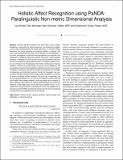| dc.contributor.author | Zhang, Yue | |
| dc.contributor.author | Weninger, Felix | |
| dc.contributor.author | Bjorn, Schuller | |
| dc.contributor.author | Picard, Rosalind W. | |
| dc.date.accessioned | 2020-02-13T20:24:53Z | |
| dc.date.available | 2020-02-13T20:24:53Z | |
| dc.date.issued | 2019-12 | |
| dc.identifier.issn | 1949-3045 | |
| dc.identifier.issn | 2371-9850 | |
| dc.identifier.uri | https://hdl.handle.net/1721.1/123806 | |
| dc.description.abstract | Humans perceive emotion from each other using a holistic perspective, accounting for diverse personal, non-emotional variables that shape expression. In contrast, today's algorithms are mainly designed to recognize emotion in isolation. In this work, we propose a multi-task learning approach to jointly learn the recognition of affective states from speech along with various speaker attributes. A problem with multi-task learning is that sometimes inductive transfer can negatively impact performance. To mitigate negative transfer, we introduce the Paralinguistic Non-metric Dimensional Analysis (PaNDA) method that systematically measures task relatedness and also enables visualizing the topology of affective phenomena as a whole. In addition, we present a generic framework that conflates the concepts of single-task and multi-task learning. Using this framework, we construct two models that demonstrate holistic affect recognition: one treats all tasks as equally related, whereas the other one incorporates the task correlations between a main task and its supporting tasks obtained from PaNDA. Both models employ a multi-task deep neural network, in which separate output layers are used to predict discrete and continuous attributes, while hidden layers are shared across different tasks. On average across 18 classification and regression tasks, the weighted multi-task learning with PaNDA significantly improves performance compared to single-task and unweighted multi-task learning. | en_US |
| dc.description.sponsorship | EU | en_US |
| dc.publisher | Institute of Electrical and Electronics Engineers (IEEE) | en_US |
| dc.relation.isversionof | http://dx.doi.org/10.1109/taffc.2019.2961881 | en_US |
| dc.rights | Creative Commons Attribution-Noncommercial-Share Alike | en_US |
| dc.rights.uri | http://creativecommons.org/licenses/by-nc-sa/4.0/ | en_US |
| dc.source | Prof. Picard via Elizabeth Soergel | en_US |
| dc.title | Holistic Affect Recognition Using PaNDA: Paralinguistic Non-metric Dimensional Analysis | en_US |
| dc.type | Article | en_US |
| dc.identifier.citation | Zhang, Y. et al. "Holistic Affect Recognition Using PaNDA: Paralinguistic Non-metric Dimensional Analysis," IEEE Transactions on Affective Computing (December 2019). © 2019 IEEE | en_US |
| dc.contributor.department | Massachusetts Institute of Technology. Media Laboratory | en_US |
| dc.relation.journal | IEEE Transactions on Affective Computing | en_US |
| dc.eprint.version | Final published version | en_US |
| dc.type.uri | http://purl.org/eprint/type/JournalArticle | en_US |
| eprint.status | http://purl.org/eprint/status/PeerReviewed | en_US |
| dspace.date.submission | 2020-02-08T15:03:27Z | |
| mit.license | OPEN_ACCESS_POLICY | |
| mit.metadata.status | Complete | |
